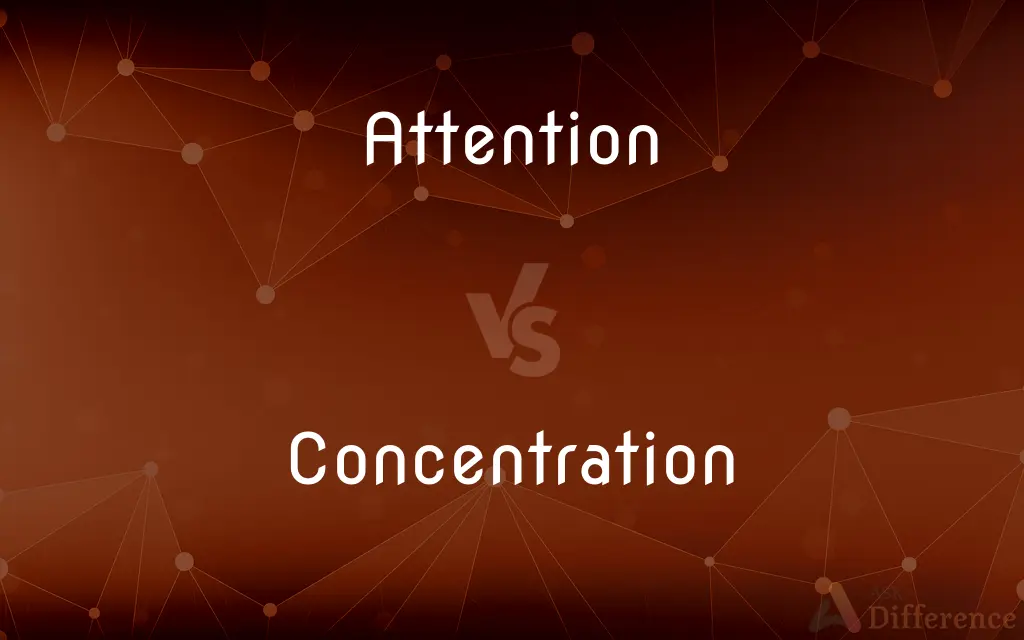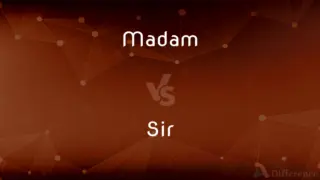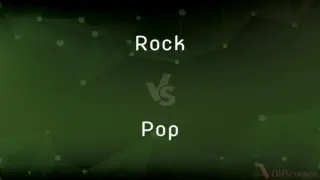Attention vs. Concentration — What's the Difference?
By Tayyaba Rehman — Updated on November 6, 2023
Attention is the act of focusing sensory awareness; concentration is maintaining that focus on a specific task or thought over time.

Difference Between Attention and Concentration
Table of Contents
ADVERTISEMENT
Key Differences
Attention and concentration, while related, denote different aspects of focus. Attention is the broader term, referring to the initial act of directing cognitive resources toward a particular stimulus. It's the gateway through which sensory information gains cognitive processing. On the other hand, concentration refers to the sustained effort of keeping that attention steady and undivided over a period of time. Thus, one might easily pay attention to a noise, but it takes concentration to continue listening to and interpreting that noise if it is a complex piece of music.
Attention can be involuntary or voluntary, snapping to a sudden sound or carefully aligning to a chosen input, such as a conversation. It's more about the immediacy of the cognitive spotlight. Concentration, in contrast, is inherently a voluntary, effortful process. It demands deliberate control to maintain attention on a task despite distractions. Concentration is often measured by how long one can keep this focus, which requires a more active engagement than attention might.
In the realm of multitasking, attention can be rapidly shifted between tasks, suggesting a level of agility and responsiveness. It can be seen as more fluid and dynamic. Concentration, however, may deteriorate with multitasking, as it relies on channeling mental resources toward a singular activity. One may easily switch attention from one task to another, but concentrating on multiple tasks simultaneously is significantly more challenging.
Neurologically, attention involves various brain systems that align with the sensory organs' input, acting as a filter for relevance. This filtering is crucial for the brain's subsequent decision on where to concentrate its resources. Concentration then taps into additional neural circuits associated with executive function, requiring ongoing regulation of attention to resist the pull of off-task distractions.
Understanding attention and concentration as separate but intertwined elements helps in both educational and professional settings. Effective teaching strategies, for example, must initially capture students' attention before engaging their concentration for deeper learning. In the workplace, understanding the differences can lead to improved productivity by creating environments that first draw attention and then support prolonged concentration.
ADVERTISEMENT
Comparison Chart
Definition
Initial sensory awareness.
Sustained mental focus.
Duration
Short-term and immediate.
Long-term and enduring.
Effort
Can be involuntary or voluntary.
Primarily a voluntary, effortful process.
Flexibility
Can be easily shifted; dynamic.
Requires stability; can be compromised by multitasking.
Neurological Basis
Involves sensory and immediate cognitive processes.
Involves executive functions for sustained attention.
Compare with Definitions
Attention
Alertness to the environment
Her attention to the faint sounds saved the team from danger.
Concentration
Focused mental engagement
His concentration while solving complex equations was intense.
Attention
Consideration for details
Attention to detail is crucial for an editor.
Concentration
The action of gathering together
The concentration of resources made the project feasible.
Attention
Directing the mind to an object
Her attention was captured by the bright painting.
Concentration
High level of intensity in an activity
The game requires intense concentration.
Attention
Attention is the behavioral and cognitive process of selectively concentrating on a discrete aspect of information, whether considered subjective or objective, while ignoring other perceivable information. William James (1890) wrote that "Attention is the taking possession by the mind, in clear and vivid form, of one out of what seem several simultaneously possible objects or trains of thought.
Concentration
Close gathering of people or things
A high concentration of artists live in this area.
Attention
Notice taken of someone or something; the regarding of someone or something as interesting or important
He drew attention to three spelling mistakes
Concentration
Chemical measure of substance in a mixture
The concentration of salt in the water was measured.
Attention
The action of dealing with or taking special care of someone or something
He was found guilty of failing to give a patient adequate medical attention
Her business needed her attention
Concentration
In chemistry, concentration is the abundance of a constituent divided by the total volume of a mixture. Several types of mathematical description can be distinguished: mass concentration, molar concentration, number concentration, and volume concentration.
Attention
A position assumed by a soldier, standing very straight with the feet together and the arms straight down the sides of the body
Saunders stood stolidly to attention
Concentration
The action or power of focusing all one's attention
She was frowning in concentration
Attention
The act of close or careful observing or listening
You'll learn more if you pay attention in class.
Concentration
A close gathering of people or things
The island has the greatest concentration of seabirds in the north-west
Attention
The ability or power to keep the mind on something; the ability to concentrate
We turned our attention to the poem's last stanza.
Concentration
The relative amount of a particular substance contained within a solution or mixture or in a particular volume of space
The gas can collect in dangerous concentrations
Attention
Notice or observation
The billboard caught our attention.
Concentration
The act or process of concentrating, especially the fixing of close, undivided attention.
Attention
The act of dealing with something or someone; treatment
This injury requires immediate medical attention.
Concentration
The condition of being concentrated.
Attention
Acts of interest or interference
"men who wanted ... freedom from censorship and the attentions of the police" (John Kenneth Galbraith).
Concentration
Something that has been concentrated.
Attention
Acts of consideration or courtesy, especially in an effort to win someone's affection or gain sexual favors
"She was almost giddy with disbelief at the unexpected attentions of a handsome, well-spoken, obviously professional man" (Rob Kantner).
Concentration
(Chemistry) The amount of a specified substance in a unit amount of another substance.
Attention
A military posture, with the body erect, eyes to the front, arms at the sides, and heels together.
Concentration
The act, process or ability of concentrating; the process of becoming concentrated, or the state of being concentrated.
Attention
Used as a command to assume an erect military posture.
Concentration
The direction of attention to a specific object.
Attention
(uncountable) Mental focus.
Please direct your attention to the following words.
Concentration
The act, process or product of reducing the volume of a liquid, as by evaporation.
Attention
(countable) An action or remark expressing concern for or interest in someone or something, especially romantic interest.
Concentration
The act or process of removing the dress of ore and of reducing the valuable part to smaller compass, as by currents of air or water.
Attention
A state of alertness in the standing position.
The company will now come to attention.
Concentration
A field or course of study on which one focuses, especially as a student in a college or university.
Attention
A technique in neural networks that mimics cognitive attention, enhancing the important parts of the input data while giving less priority to the rest.
Concentration
The proportion of a substance in a whole.
Attention
(military) Used as a command to bring soldiers to the attention position.
Concentration
(chemistry) The amount of solute in a solution measured in suitable units (e.g., parts per million (ppm))
Attention
A call for people to be quiet/stop doing what they are presently doing and pay heed to what they are to be told or shown.
Concentration
The matching game pelmanism.
Attention
The act or state of attending or heeding; the application of the mind to any object of sense, representation, or thought; notice; exclusive or special consideration; earnest consideration, thought, or regard; obedient or affectionate heed; the supposed power or faculty of attending.
They say the tongues of dying menEnforce attention like deep harmony.
Concentration
The act or process of concentrating; the process of becoming concentrated, or the state of being concentrated; concentration.
Concentration of the lunar beams.
Intense concetration of thought.
Attention
An act of civility or courtesy; care for the comfort and pleasure of others; as, attentions paid to a stranger.
Concentration
The act or process of reducing the volume of a liquid, as by evaporation.
The acid acquires a higher degree of concentration.
Attention
The process whereby a person concentrates on some features of the environment to the (relative) exclusion of others
Concentration
The act or process of removing the dress of ore and of reducing the valuable part to smaller compass, as by currents of air or water.
Attention
The work of caring for or attending to someone or something;
No medical care was required
The old car needed constant attention
Concentration
The strength of a solution; number of molecules of a substance in a given volume (expressed as moles/cubic meter)
Attention
A general interest that leads people to want to know more;
She was the center of attention
Concentration
The spatial property of being crowded together
Attention
A courteous act indicating affection;
She tried to win his heart with her many attentions
Concentration
Strengthening the concentration (as of a solute in a mixture) by removing extraneous material
Attention
The faculty or power of mental concentration;
Keeping track of all the details requires your complete attention
Concentration
Increase in density
Attention
A motionless erect stance with arms at the sides and feet together; assumed by military personnel during drill or review;
The troops stood at attention
Concentration
Complete attention; intense mental effort
Attention
Presence of mind
His attention during the lecture was commendable.
Concentration
Bringing together military forces
Attention
The act of dealing with something or someone
The nurse's attention to the patients was admirable.
Concentration
Great and constant diligence and attention
Common Curiosities
Is attention the same as awareness?
No, attention is the focus on specific stimuli, while awareness is the acknowledgment of stimuli without the focused engagement.
Can you train your attention?
Yes, attention can be improved with practices like mindfulness and attention-enhancing exercises.
What is concentration in the context of mental skills?
Concentration is the mental effort placed on focusing attention consistently on a single task or thought over a period of time.
How does attention affect learning?
Attention is critical for learning as it allows the brain to process and retain information; without attention, effective learning is significantly hindered.
Are there disorders related to attention?
Yes, Attention-Deficit/Hyperactivity Disorder (ADHD) is one of the most common disorders related to difficulties in maintaining attention.
How can concentration be improved?
Concentration can be improved through regular practice, mindfulness, removing distractions, and increasing engagement with the task at hand.
What is selective attention?
Selective attention is the process of focusing on a particular object in the environment for a certain period of time, while ignoring irrelevant data.
Can multitasking affect concentration?
Yes, multitasking can impair concentration by constantly shifting attention, which prevents deep and sustained focus on any one task.
What is attention in psychology?
Attention is the cognitive process of selectively focusing on a discrete aspect of information, whether subjective or environmental.
Is concentration necessary for all types of work?
While concentration benefits most tasks, some work that requires creativity might benefit from a less focused, more diffused form of thinking.
Can anxiety affect concentration?
Yes, anxiety can significantly disrupt concentration by causing distracting thoughts and heightened emotional responses.
How does digital media consumption impact attention and concentration?
High digital media consumption can lead to shorter attention spans and difficulties in maintaining concentration due to constant stimuli and multitasking.
How do attention and concentration interact?
Attention is the initial act of focusing, while concentration is maintaining that focus; concentration cannot occur without attention first being directed.
What role does sleep play in attention and concentration?
Adequate sleep is crucial for maintaining optimal levels of attention and concentration; sleep deprivation impairs both cognitive functions.
Are there foods that help with concentration?
Certain foods, like those rich in omega-3 fatty acids, antioxidants, and vitamins, are believed to improve brain function and concentration.
Share Your Discovery

Previous Comparison
Madam vs. Sir
Next Comparison
Rock vs. PopAuthor Spotlight
Written by
Tayyaba RehmanTayyaba Rehman is a distinguished writer, currently serving as a primary contributor to askdifference.com. As a researcher in semantics and etymology, Tayyaba's passion for the complexity of languages and their distinctions has found a perfect home on the platform. Tayyaba delves into the intricacies of language, distinguishing between commonly confused words and phrases, thereby providing clarity for readers worldwide.
















































